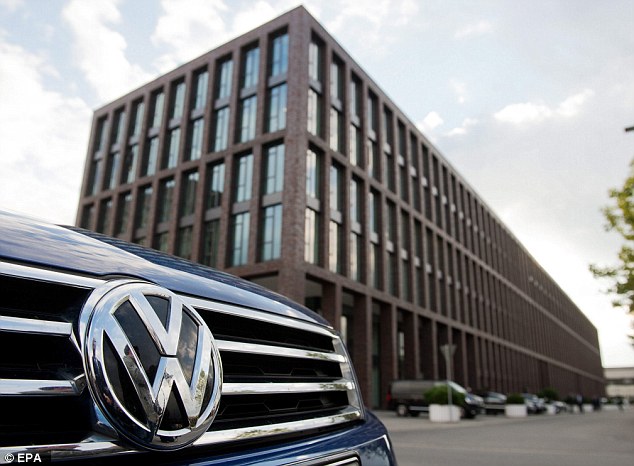Volksboten! Switzerland bans VW diesel cars equipped with 'defeat devices' for cheating emissions tests
- EU scientists uncovered the use of 'defeat devices' such as VW's in 2011
- The British Government also warned about their use more than a year ago
- Watchdogs now want tougher and more realistic emissions testing
- Critics claim the existing tests are too easy to foil and are unrealistic
Switzerland has banned sales of Volkswagen Group cars with outdated emissions systems in the wake of the test-rigging scandal that started in the United States.
Thomas Rohrbach, spokesman for the Swiss federal office of roadways, said the ban applied to all cars with diesel engines in the Euro 5 emissions category. It includes all VW models as well as Seat, Skoda and others in the VW group.
The ban affects only cars not yet sold or registered, not ones already in circulation. It does not apply to cars now in production with Euro 6 engines, which are not affected by the emissions scandal.
Scroll down for video

EU watchdogs warned about the use of 'defeat devices' for exhaust emissions by car manufacturers in 2013

EU scientists discovered the use of 'defeat devices' in 2011 but waited two years before publishing the results
Mr Rohrbach said the ban could potentially affect 180,000 vehicles that have 1.2, 1.6 and 2.0-litre diesel engines.
Volkswagen has said the 11 million vehicles worldwide that contain software involved in the emissions-rigging scandal include some five million cars made by its core VW brand.
VW's brand chief Herbert Diess said 'we are working at full speed on a technical solution that we will present to partners, to our customers and to the public as swiftly as possible'.
The ban comes after in emerged that EU environmental watchdogs warned about the use of 'defeat devices' to fiddle exhaust emissions when cars were being tested after uncovering their use in 2011.
Scientists discovered that some cars had been fitted with the technology after conducting research in 2011, but this information was not made public until 2013.
Yet, despite this knowledge being available to regulators and watchdogs, VW continued to use this technology until this year.
A report in 2013 by the European Commission's Joint Research Centre highlighted the issues around so-called 'defeat devices' which fiddle the results of official car emissions tests by making vehicles appear cleaner than they really are, the Financial Times reported.
They pointed to 'unequivocal' weaknesses in the emissions testing system.
But regulators failed to follow up on the warnings – despite the fact that the technology had been ruled illegal in Europe since 2007.

Experts warned that there were 'weaknesses in the current type approval procedure' that could be exploited
The JCR's report had argued that cars should be tested in real-world conditions on the road, rather than in the lab to reduce the risk of cheating.
'Sensors and electronic components in modern light-duty vehicles are capable of 'detecting' the start of an emissions test in the laboratory', it said.
The 'defeat devices' could also 'activate, modulate, delay or deactivate emissions control systems', the report added.
'Tests conducted on the road, rather than in the lab 'show that the real world nitrogen oxides (NOx) emissions of light duty diesel vehicles substantially exceed the regulatory emissions standards'.
It also stressed: 'The existing on-road tests unequivocally point to weaknesses in the current type approval procedure.'
Experts said loopholes in a 2007 ban on 'defeat devices' allowed cheating to take place. Calls for tougher tests were also resisted.
Meanwhile, Volkswagen meanwhile revealed last night how its top selling Golf , Passat and Tiguan models are at the centre of the world wide recall – with 5 million of the 11 million affected vehicles bearing the Volkswagen badge.
The comapny said: 'Certain models and model years of these vehicles (such as the sixth generation Volkswagen Golf, the seventh generation Volkswagen Passat and the first generation Volkswagen Tiguan) are equipped exclusively with type EA 189 diesel engines.
However, all new Volkswagen cars fitted with engines that meet new EU6 standards across Europe 'are not affected' it said including the 'current' Golf, Passat and Touran models.'
Dr. Herbert Diess, chief executive of Volkswagen passenger cars said: 'We are working at full speed on a technical solution that we will present to partners, to our customers and to the public as swiftly as possible.
'Our aim is to inform our customers as quickly as possible, so that their vehicles comply fully with regulations. I assure you that Volkswagen will do everything humanly possible to win back the trust of our customers, the dealerships and the public.'
-
 Breathtaking voice of 11-year-old boy singing Adele's Hello
Breathtaking voice of 11-year-old boy singing Adele's Hello
-
 Refugees attack elderly man on the Metro in Munich
Refugees attack elderly man on the Metro in Munich
-
 Palin: 'It wasn't tough' deciding between Cruz and Trump
Palin: 'It wasn't tough' deciding between Cruz and Trump
-
 Heartbreaking footage shows abused dog staring at a wall
Heartbreaking footage shows abused dog staring at a wall
-
 Abused dog Cara barks and plays with another dog in recovery
Abused dog Cara barks and plays with another dog in recovery
-
 Surfer falls 40 feet in major wipeout at Jaws in Hawaii
Surfer falls 40 feet in major wipeout at Jaws in Hawaii
-
 Hillary Clinton addresses crowd after Iowa caucus vote
Hillary Clinton addresses crowd after Iowa caucus vote
-
 Furious woman unleashes vile racist rant on subway carriage
Furious woman unleashes vile racist rant on subway carriage
-
 'The VA is f***ed up': Young vet rants on live TV in Iowa
'The VA is f***ed up': Young vet rants on live TV in Iowa
-
 Sheriff's Deputy celebrates retirement by doing Whip/Nae Nae
Sheriff's Deputy celebrates retirement by doing Whip/Nae Nae
-
 'Sticker kid' steals spotlight during Clinton speech in Iowa
'Sticker kid' steals spotlight during Clinton speech in Iowa
-
 'He is the man': Melania joins Trump for last push in Iowa
'He is the man': Melania joins Trump for last push in Iowa
-
 Mutant 'fish' with a nose, feet, tail and WINGS baffles...
Mutant 'fish' with a nose, feet, tail and WINGS baffles...
-
 Hillary and Bernie hold their breath: Clinton claims ...
Hillary and Bernie hold their breath: Clinton claims ...
-
 Shock video sparks police hunt in Munich for migrant men who...
Shock video sparks police hunt in Munich for migrant men who...
-
 EXCLUSIVE ‘She slid her hand down her jeans, looked me in...
EXCLUSIVE ‘She slid her hand down her jeans, looked me in...
-
 Gone girl: Sarah Palin makes swift exit from Iowa as Trump...
Gone girl: Sarah Palin makes swift exit from Iowa as Trump...
-
 American Hot Rod star becomes poster boy for dangers of...
American Hot Rod star becomes poster boy for dangers of...
-
 EXCLUSIVE: Phil Collins' disabled third wife claims she...
EXCLUSIVE: Phil Collins' disabled third wife claims she...
-
 Trump thumped: Cruz bests The Donald with crushing Iowa...
Trump thumped: Cruz bests The Donald with crushing Iowa...
-
 Hello… it’s an 11-year-old boy singing his own version of...
Hello… it’s an 11-year-old boy singing his own version of...
-
 Germany hands out cartoon etiquette guides at swimming baths...
Germany hands out cartoon etiquette guides at swimming baths...
-
 Heartbreaking video shows dog so traumatised by years of...
Heartbreaking video shows dog so traumatised by years of...
-
 Spot the big cat! Photographer snaps sneaky cheetah creeping...
Spot the big cat! Photographer snaps sneaky cheetah creeping...









































































































































































































































































































































































